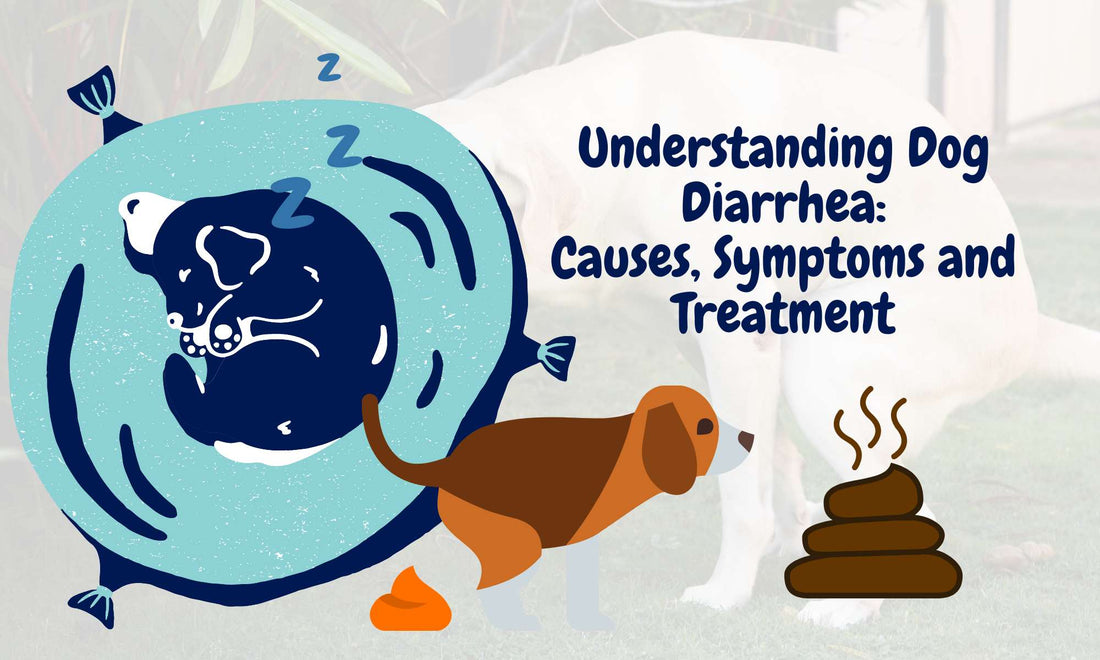Cleaning up after a dog with diarrhea is quite common, although most owners don't like to discuss it. It may not be enjoyable to think about, but many pet owners will eventually have to handle this.
The variation in occurrence rate, length of time it persists, and severity level are factors that determine a dog's diarrhea. While complete prevention is unlikely, obtaining more information regarding this condition might assist in reducing how frequently your dog suffers from diarrhea and may also decrease symptom length.
Your dog's diarrhea can be managed with several over-the-counter treatments that are available. These remedies can surely bring relief to you and your furry friend. Don't feel hopeless if your dog is experiencing diarrhea. To help them feel their best again, you can take steps to alleviate their discomfort.
Pet owners may find dog diarrhea to be a frequent and annoying problem. Both the dog and the owner find it unpleasant. Furthermore, it could indicate other substantial health issues. We will discuss everything about dog diarrhea in this article, including its causes, symptoms, treatment, and prevention measures.

The Dog’s Digestive System:
The process of converting food into usable nutrients for a dog's energy requirements along with proper growth and repair is carried out by their digestive system, and breaking down food into smaller pieces initiates in the mouth through teeth and saliva. As soon as it reaches the stomach via the esophagus, food gets broken down by acid with the help of enzymes.
It is only after departing from the stomach chamber that the food goes on to reach the small intestines, which play an influential role in absorbing most of the nutrients into the bloodstream, so when there is any remaining waste material present in your body, it moves on to reach your large intestine. Here it undergoes a process wherein excess water gets drained out and solid excreta are formed, so finally stool exits through the anus.
Why is my dog pooping liquid?
A common sign that a dog may have diarrhea is when they pass loose or watery stools. Among the various reasons for this problem are dietary changes, food allergies, infections, parasites, and stress. To ensure that your dog receives the appropriate treatment for its diarrhea, it is vital to identify what caused it.
What Poop Says About Your Dog’s Health
Wondering what information you can gather from analyzing your furry friend's waste? A lot can be discovered about what's going on inside someone's body simply by analyzing the texture and hue of their bowel movements, so it's important that you provide accurate information on any experience with a certain change in consistency or color when describing your dog's diarrhea symptoms. Home treatment may resolve many cases of diarrhea; however, if the condition doesn't get better or symptoms point towards something serious, consulting with a vet is necessary.
To help you understand what constitutes "normal" poop for a dog, Purina has created an infographic that shows what a healthy bowel movement should look like. According to experts, ideal dog poop should be chocolate brown, shaped like logs, and easy to scoop. It should feel similar to cookie dough or Play-Doh when pressed. If your dog's feces are watery, pudding-like, contain mucus or blood streaks, or are in large volumes, this may indicate an issue.
Color can also provide valuable information about what's happening inside your dog's gut. Chocolate brown is normal, but other colors like orange, green, or gray may suggest problems with organs like the liver, gall bladder, or pancreas. Black, tarry stool is a red flag and may indicate internal bleeding, so it's crucial to contact your vet immediately if you notice this.
In addition to color, other factors like shape and consistency can also reveal important information about your dog's health. For instance, small amounts of feces with straining may indicate inflammation of the large bowel, while odd-shaped or colored solid objects may suggest that your dog has ingested something they couldn't digest. By paying attention to these details and working with your vet, you can help keep your furry friend healthy and happy.
Causes of Dog Diarrhea:
Dietary Changes: If you've recently changed your dog's diet or introduced new foods, this can cause diarrhea as their digestive system adjusts.
Food Allergies or Intolerances: Some dogs may have allergies or intolerances to certain ingredients in their food, which can cause diarrhea.
Infections: Infections such as parvovirus, salmonella, or giardia can cause diarrhea in dogs.
Parasites: Parasites such as roundworms or hookworms can cause diarrhea, especially in puppies.
Stress or Anxiety: Stressful situations, such as moving or a change in routine, can cause diarrhea in some dogs.
Medications or Toxins: Certain medications or toxins can irritate the digestive system and cause diarrhea.
Inflammatory Bowel Disease (IBD): IBD is a chronic condition that causes inflammation in the digestive tract, leading to diarrhea, vomiting, and weight loss.
Symptoms of Dog Diarrhea:
The symptoms of dog diarrhea can vary from mild to severe. Some common signs include loose stools, frequent bowel movements, vomiting, loss of appetite, lethargy, and dehydration. If your dog is experiencing any of these symptoms, it is crucial to seek veterinary care immediately.
How is the cause of diarrhea determined?
If your dog is experiencing diarrhea, your vet will likely perform a physical exam and take a stool sample for analysis. This can help determine if there are any underlying infections or parasites that need to be treated. In some cases, additional tests such as blood work or imaging may be necessary to identify the cause of the diarrhea.
How serious is diarrhea in dogs?
Mild cases of diarrhea can often be treated at home with dietary changes or over-the-counter medications. However, severe or persistent diarrhea can lead to dehydration, malnutrition, and other complications. If your dog is experiencing diarrhea for more than 24-48 hours, it's essential to consult with your vet.
How do I know if my dog’s diarrhea is serious?
If your dog is experiencing any of the following symptoms along with diarrhea, it's crucial to seek veterinary care immediately:
• Bloody or black stools
• Vomiting
• Loss of appetite
• Lethargy or weakness
• Abdominal pain or discomfort
• Fever
How long will dog diarrhea last?
The duration of dog diarrhea can vary depending on the cause and severity of the condition. In some cases, mild diarrhea may resolve on its own within a day or two. However, if your dog is experiencing persistent or severe diarrhea, it's essential to consult with your vet.
My dog has diarrhea but is acting fine:
If your dog is otherwise healthy and not experiencing any other symptoms, you may be able to treat the diarrhea at home. Dietary changes, such as feeding your dog a bland diet of boiled chicken and rice, can help soothe the digestive system. Over-the-counter medications such as probiotics or anti-diarrheal agents may also be helpful. However if your dog's diarrhea persists or is accompanied by other symptoms, it's crucial to consult with your vet to determine the underlying cause and the best course of treatment.
Dog diarrhea when to worry:
As mentioned earlier, if your dog is experiencing any of the following symptoms along with diarrhea, it's essential to seek veterinary care immediately:
• Bloody or black stools
• Vomiting
• Loss of appetite
• Lethargy or weakness
• Abdominal pain or discomfort
• Fever
How do you treat a dog with diarrhea?
The treatment for dog diarrhea depends on the underlying cause of the condition. In some cases, mild diarrhea can be treated with dietary changes such as a bland diet of boiled chicken and rice. Over-the-counter medications such as probiotics or anti-diarrheal agents may also be helpful.
If your dog is experiencing severe or persistent diarrhea, your vet may prescribe medications to treat the underlying cause of the condition. In some cases, hospitalization and intravenous fluids may be necessary to treat dehydration and other complications.
Dog diarrhea home remedy:
There are several home remedies that may be helpful in treating mild cases of dog diarrhea. These include:
• A bland diet of boiled chicken and rice
• Probiotics to help restore the balance of gut bacteria
• Pumpkin or sweet potato, which can help firm up stools
• Chamomile tea, which can help soothe the digestive system
• Bone broth, which can help provide hydration and nutrients
• It's important to note that while home remedies may be helpful in treating mild cases of dog diarrhea, it's crucial to consult with your vet to determine the underlying cause and the best course of treatment.
Kitchen Cures for Dog Diarrhea:
There are several foods that may be helpful in treating dog diarrhea. These include:
• Boiled chicken and rice, which is a bland diet that can help soothe the digestive system
• Canned pumpkin, which can help firm up stools
• Cottage cheese, which is easy to digest and can help provide protein
• Bone broth, which can help provide hydration and nutrients
• Sweet potato, which is high in fiber and can help regulate the digestive system
• Again, it's essential to consult with your vet to determine the underlying cause of your dog's diarrhea and the best course of treatment.
When Dog Diarrhea Means a Trip to the Vet:
If your dog is experiencing severe or persistent diarrhea, or if it's accompanied by other symptoms such as vomiting, loss of appetite, or lethargy, it's crucial to seek veterinary care immediately. Your vet can help determine the underlying cause of the condition and the best course of treatment.
What is the prognosis?
The prognosis for dog diarrhea depends on the underlying cause of the condition. In many cases, mild diarrhea can be treated at home with dietary changes or over-the-counter medications. However, severe or persistent diarrhea may require veterinary care, including medications and hospitalization. With prompt and appropriate treatment, most cases of dog diarrhea can be resolved with no long-term complications.
In some cases, the underlying cause of diarrhea can be difficult to determine, and it may require additional diagnostic tests such as blood work, fecal exams, or imaging tests. Your vet may also recommend changes to your dog's diet or recommend medications to help manage the symptoms.
If your dog's diarrhea is caused by an underlying condition such as parasites, infections, or inflammatory bowel disease, it may require ongoing management and monitoring to prevent recurrence.
It's essential to monitor your dog's symptoms closely and seek veterinary care if you notice any changes or if the symptoms persist. Diarrhea can lead to dehydration and other complications, especially in puppies, senior dogs, or dogs with underlying health conditions.
Prevention of Dog Diarrhea:
There are various preventive measures you can take to reduce the risk of your dog getting diarrhea. These include keeping your dog's vaccinations up to date, feeding them a balanced and healthy diet, providing them with clean drinking water, and avoiding exposure to parasites and other infectious diseases.
Conclusion:
In conclusion, dog diarrhea can be a common and troublesome issue for pet owners. However, with the right knowledge and care, it can be effectively treated and prevented. If your dog is experiencing any symptoms of diarrhea, it is essential to seek veterinary care immediately to identify the cause and provide appropriate treatment. By following the preventive measures mentioned above, you can reduce the risk of your dog getting diarrhea and ensure their overall health and well-being.



